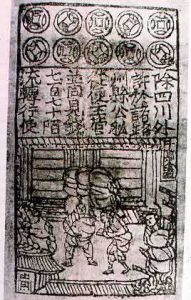
Chinese paper money
What came before paper money?
For almost two thousand years, people used metal coins for money, or they used letters of credit (like a check today).
History of money
Silver and silver mining
Why did people invent paper money?
There was a big change around 1150 AD in China, under the Song Dynasty, when people first started to use paper money (a promise to pay gold or silver or bronze in exchange for this piece of paper). People in China had also invented the first metal coins. So people in China had the first idea for both coins and paper money.
Song Dynasty China
All our China articles
A shortage of silver
The Song Dynasty started to use paper money because there are very few silver mines in China, so it was hard to get silver. Paper money was a big success.
When the Mongol Empire united Asia in the 1200s AD, Kublai Khan spread the idea of paper money spread to the Islamic Empire. From there paper money spread to Europe. Here, too, people began to use letters of credit as a substitute for money. These were letters from a bank, that you could carry around with you when you were travelling.
The Mongol Empire
Who was Kublai Khan?
Medieval Islamic economy
Medieval Europe’s economy
When you got where you were going, you could show your letter to a bank there, and that bank would give you some money. That way, you didn’t have to carry bags of money with you when you were travelling and they might get stolen. Modern checks and credit cards are based on the same idea.
Wrecking paper money
But then in the 1400s, the Ming Dynasty government didn’t have enough money to pay the soldiers. How could they get more money? They decided to print a lot more paper money. People soon figured out that this new paper money wasn’t really worth anything. They would only take silver. By 1425, China wasn’t using paper money anymore. They went back to using silver coins.
Learn by doing: look at paper money from different countries
More about the invention of coins
More about the beginning of bookkeeping
Bibliography and further reading about money:
Eyewitness: Money, by Joe Cribb (2000). Not the best in the series, but still a good introduction to exchange systems.
The History of Money: From Sandstone to Cyberspace, by Jack Weatherford (1998). Great on what money is, and how it has changed over time – some conclusions are controversial.



